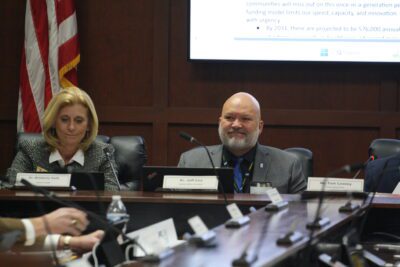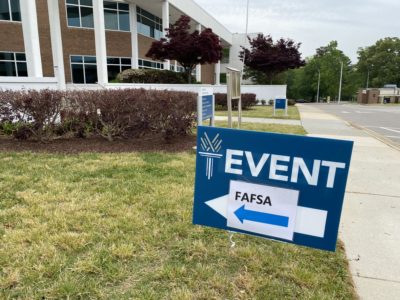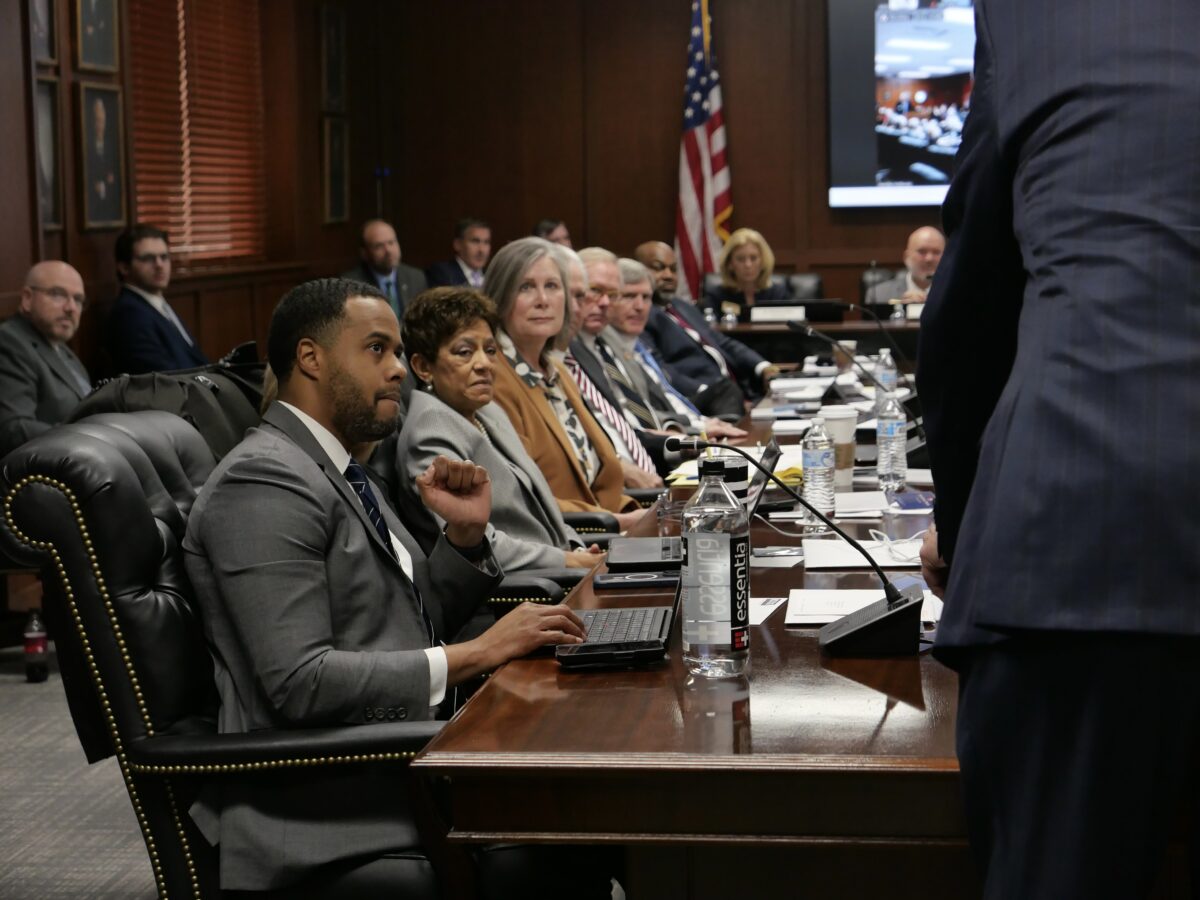

|
|
Enrollment across the N.C. Community College System (NCCCS) continued to increase this fall, according to a presentation at the State Board of Community College’s February meeting. The system saw a 4% increase in headcount in fall 2023 (393,227 students up from 377,909 in fall 2022) and a more than 5% increase in Full-Time Equivalent (FTE) student enrollment (105,174 from 99,880).
“I’ve got some good news as far as enrollment goes. We’re up pretty good,” said Dr. Bill Schneider, NCCCS vice president of system effectiveness. “We still have some work to do as far as going back to where we were before Covid… but we’re almost back to where we were.”
Schneider said the 4% increase in headcount is the largest one-year increase the system’s seen in the last 15 years. The growth in short-term credential programs was also high, he said.
Headcount is important in terms of thinking about access and the number of students served. However, because community colleges serve many part-time students, FTE enrollment is how community colleges receive state funding.
While FTE enrollment has steadily increased since fall 2020, it is still lower than before the pandemic. FTE enrollment is down nearly 2% from fall 2019, while total headcount is down by nearly 7% since then.
However, 21 colleges have seen instructional FTE increases since fall 2019, Schneider said. Fourteen colleges have seen increases in total headcount.


According to local news reports, several community colleges saw big enrollment increases this fall.
Wake Technical Community College, Durham Technical Community College, and Johnston Community College all saw record enrollment numbers for the fall semester, CBS 17 reported in August. There was also a 7% increase at Nash Community College from the 2019-2020 school year to 2022-23 .
Wake Tech also reported record enrollment numbers for the spring semester last month, with more than 23,000 degree-seeking students. That number reflects an 11% increase from last spring. According to Wake Tech, its Career and College Promise (CCP) program is one key factor for such growth. Wake Tech President Dr. Scott Ralls told CBS17 that a growing population is another factor, along with the affordability of community colleges.
“There was a time when community colleges lost more students than any other sector,” Ralls said. “Now I think we’re seeing that this is a really good time to come back after those difficult years we had with Covid.”
At Johnston Community College, more than 4,800 students enrolled in fall 2023 – a more than 10% increase from fall 2022. The college also saw a 12% increase in FTE.
Durham Tech saw a record increase in the number of new students last fall. The college also said they’re seeing gains demographically in more men enrolling, CBS17 reported, and a more than 10% gain among Black, Latino, and Asian populations.
“We’re extremely happy to see gains specifically in areas of economic growth, as well as in our university transfer programs,” Durham Tech told CBS 17. “Particular areas we are seeing include nursing-related professions, IT, as well as our college transfer program.”
North Carolina is slightly ahead of national trends.
Community colleges in the U.S. saw a 2.6% increase in fall 2023, according to a report from CCDaily.com. That reflects an increase of 118,000 students.
Many variables impact enrollment, including shifting labor trends, weather-related and population shifts, barriers to retaining students, and availability of financial aid.
NCCCS President Dr. Jeff Cox told the Board Friday that the system is working with state education stakeholders “to make a significant push” for completion of the Free Application for Federal Student Aid (FAFSA) given the delay of the new application. Since its release, multiple delays and technical glitches have been reported.
“Students who don’t apply for the FAFSA are not nearly as likely to ever enroll,” Cox said. “We need to get the word out. …It’s more important than ever (this year) because we’re behind the eight ball already.”
NCCCS leaders say solutions for enrollment require being intentional, serving historically underserved populations, and thinking beyond a one-size-fits-all approach.
Check out EdNC’s April 2023 report on enrollment on our website. That report includes a look at enrollments trends, the ways FTE is counted and why that matters, headcount data, and why we need to be thinking more about the total number of students served.
The Board also discussed several other important updates within the system, including approval of Propel NC, an amendment about the reelection of local presidents, and strategic planning work.
Propel NC receives unanimous approval
Five months after officially beginning work in August to revise its funding model, the State Board of Community Colleges unanimously approved the NCCCS’ new plan, called Propel NC, at the Board’s Feb. 16 meeting.
“This is labor-market driven and where we need to be,” Finance Committee Chair Lisa Estep said. “It’s a much needed shift.”
Under the proposed model, funding based on FTE will remain in place, but the current FTE tiers would shift to “workforce sectors.” In the new model, all curriculum and continuing education (CE) courses would reside in the same workforce sector.
The proposed sectors largely focus on health care, technology, and trades and will be ranked and valued by statewide salary job demand data every three years. Board member Ray Russell said he supported the plan but expressed hesitation at valuing jobs based on salary data. He noted the importance of child care teachers, who historically are underpaid, as an example.
Propel NC received a unanimous vote of approval from all 58 members of the N.C. Association of Community College Presidents (NCACCP) in December. Several presidents were present at the Board meeting Friday to show their support for the plan.
Now, Board members and system leaders will request consideration of Propel NC by the legislature during the short session in April. In the meantime, community college leaders will continue to meet with their legislative delegations, Cox said.
So far, the system has more than 100 letters of endorsement for the plan from businesses across the state, State Board Chair Tom Looney said. He thanked the Board, NCCCS funding model working group, NCACCP, and college trustees for their vision and leadership on the project.
“Propel NC is a dynamic and responsive change that allows us to meet the evolving needs of employers and get the next generation of workers ready for high-demand, good-paying jobs,” Looney said in a system release. “We need to take action now to ensure that our colleges continue to lead in delivering a skilled workforce essential for North Carolina’s ongoing economic development.”
Lt. Gov. Mark Robinson, an ex-officio member of the State Board, praised the plan on Friday. He also expressed support for the plan at the Board’s January meeting.
The plan includes a $93 million recurring ask to lawmakers, according to a NCCCS document outlining the model.
Here are the other components of the plan:
- Increase in base funding. The plan calls to increase the base allocation for instructional and academic support funds 5.8%, “which closes the gap to actual spending patterns and account for inflation,” per the NCCCS document. “This modification would also increase the enrollment allotment above 750 FTE based on this increase in other costs funding.”
- Enrollment increase reserve. The current enrollment growth reserve was implemented in 2010 in response to the large number of students enrolling in community colleges after the Great Recession. The system wants to request $6 million in non-recurring funds for a fixed per-FTE amount for any colleges that go over the enrollment threshold set by their FTE for the fiscal year. The system would then like to build replenishment of the fund into the recurring enrollment growth fund in the state budget.
- Excess tuition retention. Excess tuition receipts currently fund the enrollment increase reserve. Propel NC would change that, allowing excess tuition receipts to return to the college which generated them but only on years when the system as a whole generates excess receipts.
You can read more about Propel NC in the article below.
In addition to approving Propel NC, the Board also discussed a number of strategic-planning items. Those discussions include performance goals for strategic planning assistance across the system and an update on tactics for the strategic plan.
The Board also discussed creating a new “vision statement” for the system. A vote on that statement will take place at a future meeting.
Shaping North Carolina’s future: delivering a diverse, highly skilled workforce aligned to the labor market, supporting economic mobility and setting the national standard for innovation in higher education and workforce development.
NCCCS vision statement as recommended in draft document
Board committees also approved their individual charters on Friday, which you can view in the Board meeting documents online.
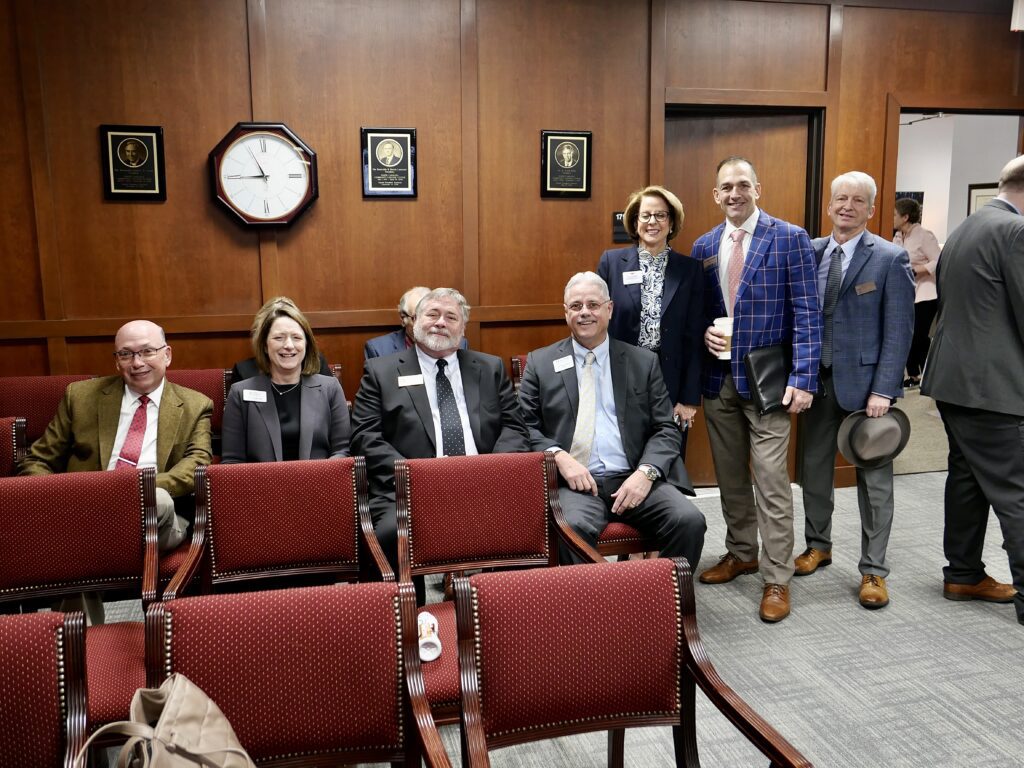

Presidential reelection process
State law has historically given the State Board of Community Colleges the authority to approve or deny the election of local college presidents by local boards of trustees. The new budget, passed in September, adds reelection authority to the Board.
In January, the Board interpreted that added statute as requiring State Board approval for any contract renewals, extensions, or amendments for local presidential contracts. Last month, the State Board proposed an amendment to the State Board of Community Colleges code to reflect that.
Board Policy and Governance Committee Chair Chaz Beasley said the committee “is still engaged in conversation” about that item, and it will come to the Board again at a future meeting.
“We want to always ensure we have the support of our presidents, the support of our trustees, and the support of our external stakeholders,” Beasley said.
After the Board takes an initial vote on the amendment revision, a period of public comment will begin. That future vote is not yet scheduled.
EdNC will include updates on how and when to submit public comment as this item is discussed by the Board. To submit public comments on amendment revisions, visit the system’s web page on numbered memos. You can view the most updated draft revision language here.
On Friday, the Board did approve an amendment revision that delegates decisions about local presidents to the Board’s personnel committee. Cox said this “is to help things move more quickly for our local colleges.”
Other personnel items
The personnel committee met in closed session on Friday to discuss five items.
The Board approved candidates for the presidency at McDowell Technical and Martin community colleges. Following the meeting, McDowell Tech announced the names of those three finalists. EdNC will update this story with Martin’s announcement once it is posted.
Michelle Krauss was approved as interim president at Pamlico Community College. Krauss was approved as acting president by the Board in December, following Dr. Jim Ross’s retirement.
The Board also approved the new hire of Travis Nobles as NCCCS director of data warehousing, with a $106,000 salary.
Finally, the Board approved the transfer of salary funds to move two employees from the technology solutions and distance learning department to programs.
The Board also introduced Jenny Varner, the new president at Davidson-Davie Community College. Varner was approved as president in November and had been serving as acting president since Darrin Hartness passed away last year.
Initiatives for student success
The Board discussed several reports regarding student success initiatives.
First, the Board discussed and approved an annual report to the General Assembly on the Career and College Promise and Cooperative Innovative High School Programs. The State Board of Education approved that report earlier this month.
Among other things, research indicates that CCP programs allow participants to earn postsecondary credentials at higher rates than their peers — with larger benefits for economically disadvantaged students.
CCP includes three pathways: Career & Technical Education (CTE), college transfer, and Cooperative Innovative High Schools (CIHS).
Here are a few highlights from that report:
- In 2022-2023, 35% of all graduates enrolled in at least one dual enrollment course, primarily through CCP, during their high school years. This represents 37,817 students, a 3% increase from the previous 2021-2022 graduating class.
- CCP graduates enrolled in a total of 252,221 college courses over the course of their high school years.
- In 2022-2023, 33% of all graduates earned high school credit through dual enrollment opportunities. This represents 35,613 students, a 3% increase from last year.
- In 2022-23, 94% percent of graduates who enrolled in a dual enrollment college course earned credit towards high school graduation.
- In 2022-2023, there were 71,468 public high school students enrolled in at least one CCP course. That reflects a 12% increase from the 2021-2022 school year.
- CCP participants were primarily female (60%) and white (58%). CTE had the highest percentage of male students (54%), and CIHS had the highest percentage of non-white students (53%). Board members discussed the importance of addressing both of these gaps.
You can view the full report, along with reporting requirements for the program, here.
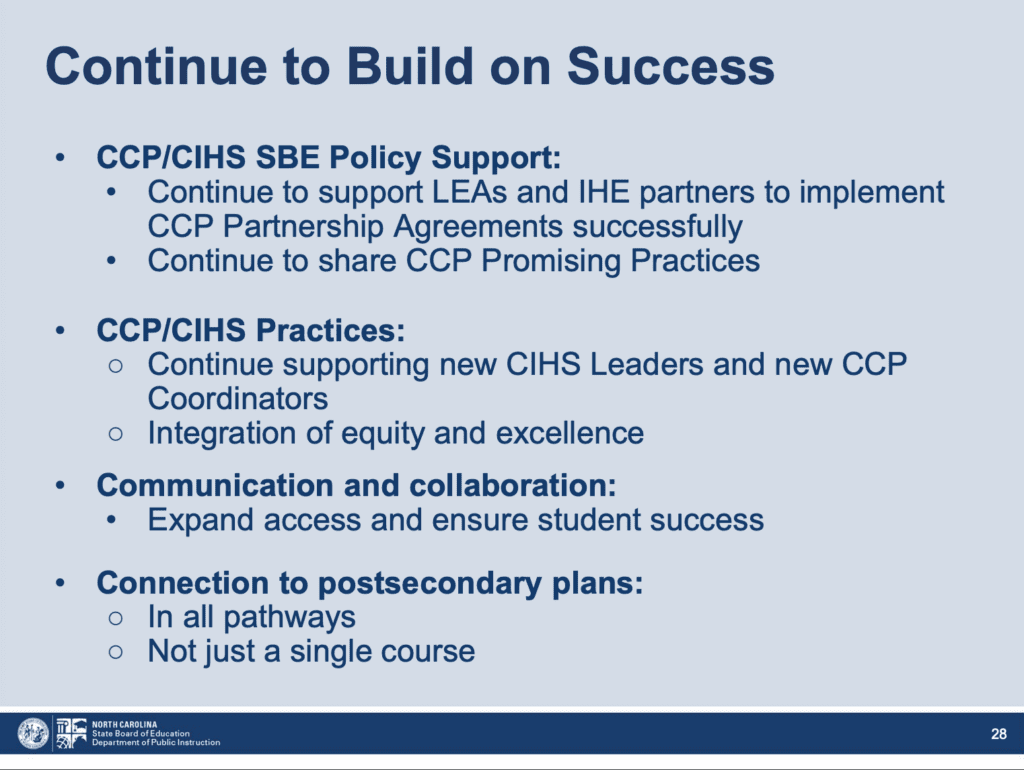

The Board approved two others reports and discussed two growth targets.
- A report to the General Assembly on the Vocational Rehabilitation Pilot Program. In 2023, the General Assembly appropriated $750,000 non-recurring funds for the program “to provide support services to community college students with intellectual and developmental disabilities to help students reach their goals for employment and independence without duplicating the existing vocational support network.” Pilot implementation will begin at select colleges in fall 2024.
- A legislative report on Rowan-Cabarrus Community College’s Biotechnology Training Center. This report will go to the General Assembly Fiscal Research Division Team. The college first received state funds for the center in 2006.
- The Board also approved recommend performance system growth targets for ApprenticeshipNC and for technical pathways for high school students. Each document includes one and three-year goals for each program across the system.
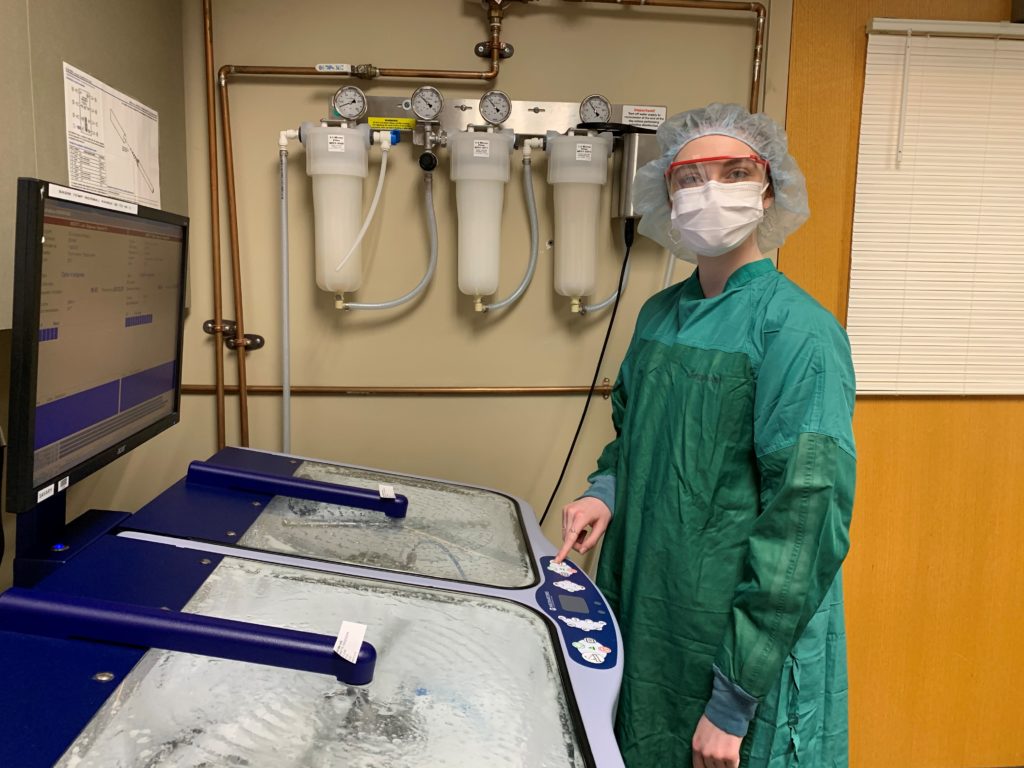

Surry-Yadkin Works
Finally, the Board also heard a presentation on Surry-Yadkin Works during its transformative discussion on Thursday.
Surry-Yadkin Works is a work-based learning program created in 2021 to connect high school students in Surry and Yadkin counties with internship and pre-apprenticeship opportunities in local high-demand fields.
The Board discussed a report from the Belk Center for Community College Leadership and Research on the partnership. You can read EdNC’s December coverage of that report here.
The partnership brings together all four public school systems in the counties, according to the report. It has assisted more than 350 students in finding 450 internship and pre-apprenticeship opportunities. Surry-Yadkin Works partners with more than 120 employers in the region.
“Surry-Yadkin Works checks all the boxes,” Dr. Travis Reeves, superintendent of Surry County Schools, told the Board.
“Surry-Yadkin Works is a vital link between the educational institutions of Surry and Yadkin Counties and our needs as an organization. It’s a strategic part of our recruitment and retention program here at Northern Regional Hospital.”
Christi Smiley, vice president of human resources at Northern Regional Hospital, quoted in Surry-Yadkins Work report
Surry Community College President Dr. David Shockley said the partnership will help Surry and Yadkin counties meet their prospective educational attainment goals.
“The benefits of a collaborative regional approach to work-based learning are significant and far-reaching,” the report says. “Every sector—including education, government, and the workforce—wins in a model designed by and with the community.”
Looney asked Shockley and Reeves how much attention they’ve gotten from the Department of Public Instruction (DPI) and other local superintendents across the state. This model should be implemented on scale in North Carolina, he said.
“I don’t want it to end with this booklet,” Looney said. “How do we get you on a bigger stage to tell this story?”
You can read the full report here. You can also read a document the Board received on regional collaborations within the system, including Surry-Yadkin Works. Partnerships related to health care were the most popular collaboration within the system, per that document.
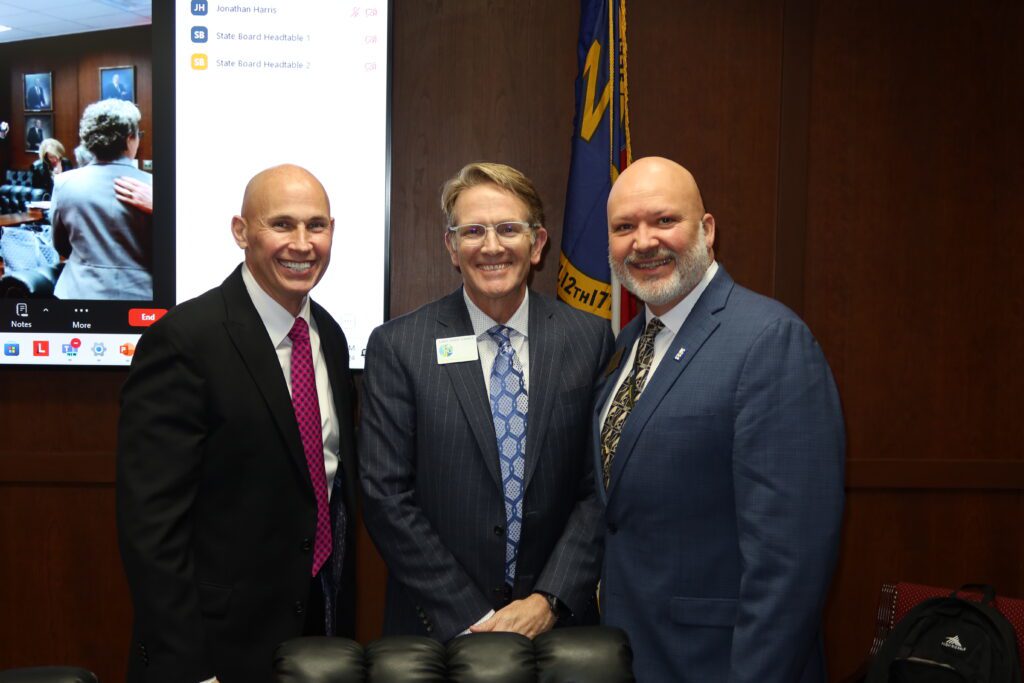

Funds for high-cost workforce programs, EEP requests, and more
- The Board approved an allocation of about $2.2 million in high-cost workforce start-up funding and $4.9 million in high-cost workforce expansion funding “to support the start-up and expansion of health care workforce programs offered at NC community colleges.” This allocation follows the General Assembly’s 2023 appropriation of $10 million in non-recurring funds toward start-up costs for new health care programs.
- The Board also discussed establishing performance growth targets for grant funding in the system. The system’s Year 1 goal is to apply for and raise $8 million in grant funding, per that draft document. The document lists a goal of $20 million for Year 2 and $40 million by Year 3. The system brought in approximately $5 million in grants in 2021 and 2022 and over $31 million in 2023.
- Two colleges received approval to offer the Elementary Education Residency Licensure Certificate Program starting in fall 2024: Guilford Technical Community College and Rowan-Cabarrus Community College.
- The Board approved several allocations of reserve funds, including $47,500 to Accreditation Consultation Services and $15,000 for Accreditation Professional Development. These funds are meant to help colleges adjust to new state law that requires schools to switch accreditors every cycle.
- The Board also approved an allocation of about $3 million to 15 colleges for the Intellectual and Developmental Disabilities (IDD) Training Program. That program was allocated nearly $4 million in the 2023-25 budget. The program first piloted in 2021 at Catawba Valley Community College and Brunswick Community College.
- The five-year findings report for community college financial audits showed that none of the colleges up for an audit in 2023 received findings. Nearly 30 colleges are scheduled for audits this year. You can also read the system’s cyber security update in the Board’s meeting materials.
The full Board meets next March 14-15 in Raleigh.




